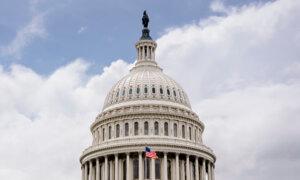The bill may satisfy moderate Republicans’ concerns but not go far enough for fiscal conservatives.
The House Energy and Commerce Committee will debate the long-awaited budget reconciliation bill on May 13, providing a crucial test for Republicans who have been at odds over ways to reduce federal spending on Medicaid.
Medicaid funding is just one portion of the massive bill that lies at the heart of President Donald Trump’s agenda to cut $1.5 trillion in federal spending over 10 years while strengthening the military and renewing the Trump tax cuts passed in 2017.
Democrats have been opposed to any changes in the program.
New Provisions
Committee Chair Brett Guthrie (R-Ky.) called the plan a common-sense reversal of Democratic policies that have financially imperiled Medicaid.
Under the Republican proposal, able-bodied adults who do not have dependents would have to complete “community engagement requirements” to remain eligible for Medicaid. That will mean spending 80 or more hours per month at work, on education, or in volunteer service.
Enrollees would also have to verify that they remain eligible for the low-income program twice a year.
Normally, annual verification of eligibility is required, though that was suspended during the COVID era. Medicaid enrollment grew to an all-time high of 94 million in March 2023, just before the verification requirement was reinstated.
The bill would also add a requirement for some Medicaid recipients who make more than 100 percent of the federal poverty level to pay certain out-of-pocket expenses. Those expenses would be limited to $35 and would not apply to emergency, prenatal, or pediatric care, or to primary care checkups.
People owning a home worth more than $1 million would not qualify for the low-income program.
Also, federal reimbursement would be reduced by 10 percent for states that allow illegal aliens to enroll in Medicaid. More than a dozen states currently offer Medicaid to children without regard to their immigration status, and several states cover pregnant women. Six states offer various health benefits to adults without regard to immigration status.
The bill would also remove a 5 percent incentive payment offered to states to enlarge their enrollment during the pandemic.
There would be a freeze on the so-called provider tax that some states use to help pay for large portions of their Medicaid programs. The extra tax often leads to higher payments from the federal government, which critics say is a loophole that allows states to inflate their budgets.
Outlook
The proposed changes would achieve the spending reductions Republicans are after, according to the Congressional Budget Office.
Democrats remain opposed to any Medicaid changes.
Still, some Republicans are not yet satisfied with the content.
House Speaker Mike Johnson (R-La.) announced a self-imposed deadline of May 26 for passage of the bill.
Original News Source Link – Epoch Times
Running For Office? Conservative Campaign Consulting – Election Day Strategies!


